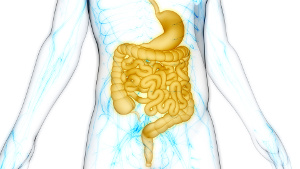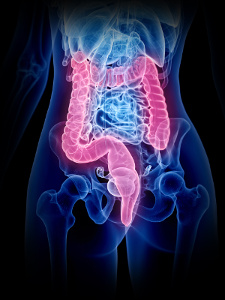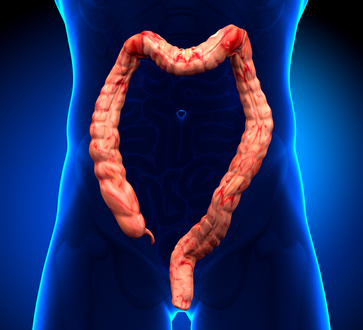 Inflammatory bowel diseases such as Crohn’s disease and ulcerative colitis are becoming more and more common, even among young people. Diet, gut flora, and immune defense play a major role. Also, patients with inflammatory bowel disease seem to have lower blood levels of vitamin D, which is linked to the chronic inflammatory state and the progression of the disease. This was demonstrated in a study that was published recently in the science journal Medicine.
Inflammatory bowel diseases such as Crohn’s disease and ulcerative colitis are becoming more and more common, even among young people. Diet, gut flora, and immune defense play a major role. Also, patients with inflammatory bowel disease seem to have lower blood levels of vitamin D, which is linked to the chronic inflammatory state and the progression of the disease. This was demonstrated in a study that was published recently in the science journal Medicine.
 People suffering from the Crohn’s disease, an inflammatory bowel disorder, often lack folic acid and vitamin B12. It is also known that this disease can be triggered by an infection with Mycobacterium avium subspecies paratuberculosis (MAP), a type of bacteria that can survives in pasteurized milk. A new study that is published in Nutrients has found why lack of folic acid and vitamin B12 disrupts the immune defense, thereby contributing to chronic inflammation that can occur in the wake of an infection with MAP.
People suffering from the Crohn’s disease, an inflammatory bowel disorder, often lack folic acid and vitamin B12. It is also known that this disease can be triggered by an infection with Mycobacterium avium subspecies paratuberculosis (MAP), a type of bacteria that can survives in pasteurized milk. A new study that is published in Nutrients has found why lack of folic acid and vitamin B12 disrupts the immune defense, thereby contributing to chronic inflammation that can occur in the wake of an infection with MAP.
 The most common inflammatory bowel diseases are Crohn’s disease and ulcerative colitis. Lack of certain nutrients can contribute to the development of these conditions. On the other hand, the diseases and the therapies used to treat them may also impair the body’s ability to absorb or utilize certain nutrients, thereby starting a vicious cycle that can make the disease worse. This was demonstrated in a new Greek study that is published in Nutrients. Chronic inflammatory bowel diseases primarily occur in the Western countries and especially at northern latitudes, which suggests that sun exposure and typically Western diets pay a major role in the development of these diseases.
The most common inflammatory bowel diseases are Crohn’s disease and ulcerative colitis. Lack of certain nutrients can contribute to the development of these conditions. On the other hand, the diseases and the therapies used to treat them may also impair the body’s ability to absorb or utilize certain nutrients, thereby starting a vicious cycle that can make the disease worse. This was demonstrated in a new Greek study that is published in Nutrients. Chronic inflammatory bowel diseases primarily occur in the Western countries and especially at northern latitudes, which suggests that sun exposure and typically Western diets pay a major role in the development of these diseases.
 A team of scientists from Århus University Hospital has discovered that high-doses supplementation with vitamin B1 can help against chronic fatigue that is seen with chronic inflammatory bowel diseases like Crohn’s disease and ulcerative colitis. High doses of vitamin B1 may even help against chronic fatigue in fibromyalgia and other neurological disorders. The scientists have not yet mapped out how the large vitamin doses affect the brain and energy levels and several theories are on the table.
A team of scientists from Århus University Hospital has discovered that high-doses supplementation with vitamin B1 can help against chronic fatigue that is seen with chronic inflammatory bowel diseases like Crohn’s disease and ulcerative colitis. High doses of vitamin B1 may even help against chronic fatigue in fibromyalgia and other neurological disorders. The scientists have not yet mapped out how the large vitamin doses affect the brain and energy levels and several theories are on the table.
 A recently published study shows promising results of giving daily supplements of vitamin D to sufferers of Crohn's disease. Apparently, the vitamin improves the intestinal barrier dysfunction associated with the ailment.
A recently published study shows promising results of giving daily supplements of vitamin D to sufferers of Crohn's disease. Apparently, the vitamin improves the intestinal barrier dysfunction associated with the ailment.
 Inflammatory bowel diseases such as Crohn’s disease and ulcerative colitis are becoming more and more common, even among young people. Diet, gut flora, and immune defense play a major role. Also, patients with inflammatory bowel disease seem to have lower blood levels of vitamin D, which is linked to the chronic inflammatory state and the progression of the disease. This was demonstrated in a study that was published recently in the science journal Medicine.
Inflammatory bowel diseases such as Crohn’s disease and ulcerative colitis are becoming more and more common, even among young people. Diet, gut flora, and immune defense play a major role. Also, patients with inflammatory bowel disease seem to have lower blood levels of vitamin D, which is linked to the chronic inflammatory state and the progression of the disease. This was demonstrated in a study that was published recently in the science journal Medicine.











 People suffering from the Crohn’s disease, an inflammatory bowel disorder, often lack
People suffering from the Crohn’s disease, an inflammatory bowel disorder, often lack The most common inflammatory bowel diseases are Crohn’s disease and ulcerative colitis. Lack of certain nutrients can contribute to the development of these conditions. On the other hand, the diseases and the therapies used to treat them may also impair the body’s ability to absorb or utilize certain nutrients, thereby starting a vicious cycle that can make the disease worse. This was demonstrated in a new Greek study that is published in Nutrients. Chronic inflammatory bowel diseases primarily occur in the Western countries and especially at northern latitudes, which suggests that sun exposure and typically Western diets pay a major role in the development of these diseases.
The most common inflammatory bowel diseases are Crohn’s disease and ulcerative colitis. Lack of certain nutrients can contribute to the development of these conditions. On the other hand, the diseases and the therapies used to treat them may also impair the body’s ability to absorb or utilize certain nutrients, thereby starting a vicious cycle that can make the disease worse. This was demonstrated in a new Greek study that is published in Nutrients. Chronic inflammatory bowel diseases primarily occur in the Western countries and especially at northern latitudes, which suggests that sun exposure and typically Western diets pay a major role in the development of these diseases. A team of scientists from Århus University Hospital has discovered that high-doses supplementation with
A team of scientists from Århus University Hospital has discovered that high-doses supplementation with  A recently published study shows promising results of giving daily supplements of vitamin D to sufferers of Crohn's disease. Apparently, the vitamin improves the intestinal barrier dysfunction associated with the ailment.
A recently published study shows promising results of giving daily supplements of vitamin D to sufferers of Crohn's disease. Apparently, the vitamin improves the intestinal barrier dysfunction associated with the ailment. "After about one week of taking the Q10 supplement I could feel a huge difference," says 23-year old Alan Piccini, who has been suffering from extreme fatigue and muscle aches ever since he was a child.
"After about one week of taking the Q10 supplement I could feel a huge difference," says 23-year old Alan Piccini, who has been suffering from extreme fatigue and muscle aches ever since he was a child. “Taking capsules with co-enzyme Q10 has freed me of the severe side effects of my cholesterol lowering medicine,” Mrs Franken explains.
“Taking capsules with co-enzyme Q10 has freed me of the severe side effects of my cholesterol lowering medicine,” Mrs Franken explains.